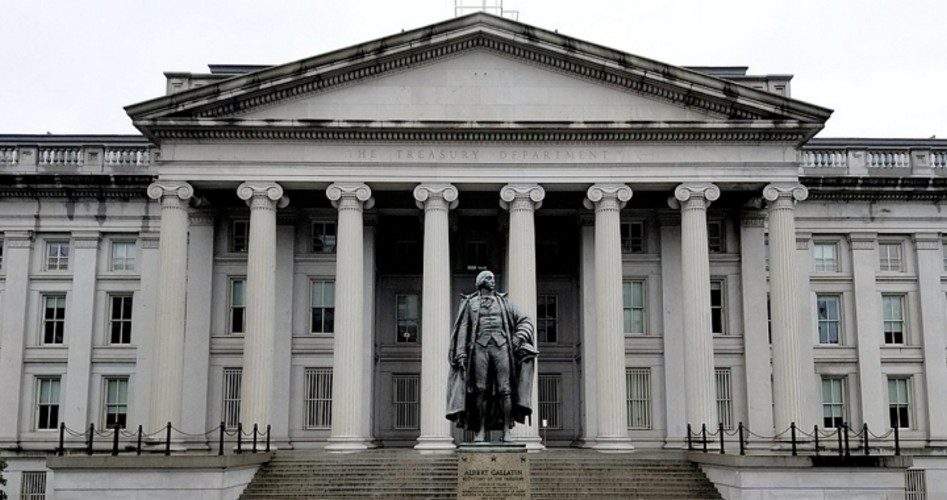
The federal government ran a deficit of $666 billion in 2017, reported the U.S. Treasury Department on Thursday, thanks mainly to increases in budget items that supposedly can’t be cut: Social Security, Medicare, Medicaid, and interest on the national debt. In addition, military spending is due for substantial increases under the Trump administration.
Translation: deficits will continue to increase every year for as far as the eye can see, routinely exceeding $1 trillion a year in a few years.
It’s not just that the government is spending more money than taxpayers are sending to Washington; government spending is growing more quickly than those tax revenues. Last year, revenues hit $3.3 trillion, but the government spent $4 trillion. Government spending was up three percent over the year before, while revenues grew by only one percent. The gap is widening, yet few in Washington want to talk about it.
Instead, all the conversation is about how to make the economy grow in the hopes that somehow, some way, revenues will advance more quickly than spending and eventually, someday, start to close the gap. Said Treasury Secretary Steven Mnuchin: “Today’s budget results underscore the importance of achieving robust and sustained economic growth. Through a combination of tax reform and regulatory relief, this country can return to higher levels of GDP growth, helping to erase our fiscal deficit.”
Trump’s Director of the Office of Management and Budget (OMB) Mick Mulvaney said that Thursday’s numbers from Treasury “should serve as a smoke alarm for Washington, a reminder that we need to grow our economy again and get our fiscal house in order. We can do that through smart spending restraint, tax reform and cutting red tape.”
And a healthy dose of pixie dust. Back in March, Mulvaney offered a spending proposal that would have cut government spending by $54 billion; but he said, “Only about 4 or 5 billion have survived so far on the Hill. We’re not going to be able to cut our way to balance [the budget].” He added, “There isn’t the political will on the Hill right now … Washington is designed to spend more money.”
The report from Treasury comes just as the Senate cleared the way for a serious discussion about tax reform, the details of which are scheduled to be released late this week. But its impact on the deficit, and the national debt, are already being debated: How can government spending be allowed to continue to grow at three percent, or more, every year, and be funded by an economy that is growing revenues by only one percent? Just how much economic growth would it take to overcome the head start that spending already has? Picture a footrace where the lead runner is not only ahead of the one in second place but he is running more quickly as well.
Most so-called experts assume that the national debt is around $20 trillion, relying on the debt clock for their information. But what if Boston Professor Laurence Kotlikoff is right, that that clock, and the assumptions behind it, are off-base? What about economists seeking to avoid reality by burying certain vital numbers, stashing them into “off-budget” accounts? Kotlikoff calls this an “economics labeling problem” which has led to what he calls “gross misreadings” of the United States’ fiscal condition. Kotlikoff has argued far and wide, including before congressional committees, that using more accurate “generational accounting” principles (how much one generation owes to another thanks to promises made by politicians over the past decades), the real national debt exceeds $200 trillion.
If that is so, then the record $8 trillion in deficits that has been rung up since 2008 will turn out to be pocket change compared to what’s coming, and no amount of pixie dust will solve the problem.
Given Washington’s current propensity to ignore the government’s spending problem by refusing to talk about it, there is ultimately only one way that the problem will be resolved. David Stockman, Mulvaney’s counterpart in the Reagan administration, calls what’s coming a “fiscal bloodbath”: “I think we are likely to have more of a fiscal bloodbath rather than fiscal stimulus. Unfortunately for Donald Trump, not only did the public vote the establishment out, they left on his doorstep the inheritance of 30 years of debt build-up and a fiscal policy that’s been really reckless in the extreme.”
Photo of U.S. Treasury Building
An Ivy League graduate and former investment advisor, Bob is a regular contributor to The New American magazine and blogs frequently at LightFromTheRight.com, primarily on economics and politics. He can be reached at [email protected].
Related article:
Sen. Paul Votes No on GOP Budget Resolution, Supports Tax Cuts “for All”



